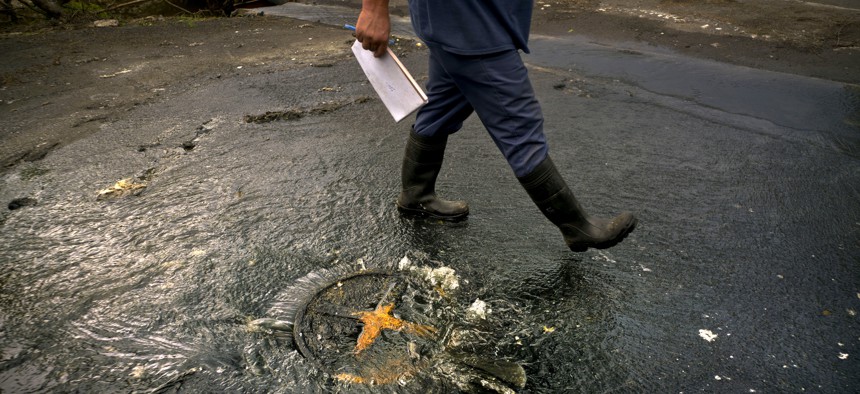Puerto Rico Is a Textbook Example of How Waterborne Disease Outbreaks Spread

a man walks past an overflowing storm drain, in Dorado, Puerto Rico, on Oct. 12. Ramon Espinosa / AP File Photo
There have been at least 74 suspected cases of leptospirosis, a bacterial illness transmitted through water, food, or soil contaminated by infected animal urine, recorded on the island so far this month.
The disaster in Puerto Rico wrought by Hurricane Maria is still unraveling one month after it hit.
Most of the island remains without electricity. A third of residents still don’t have running water, while those who do can’t count on what comes out of the faucet being clean. Meanwhile, pools and puddles of standing water due to recent heavy rains (link in Spanish) following Maria are primed to spread disease.
Carmen Deseda, Puerto Rico’s state epidemiologist, says the island has counted 74 suspected cases of leptospirosis, a bacterial illness transmitted through water, food, or soil contaminated by infected animal urine, this month so far. The illness causes symptoms such as high fever and vomiting and can be fatal without antibiotic treatment. The island normally reports only 60 cases a year, according to Deseda.
The disaster in Puerto Rico wrought by Hurricane Maria is still unraveling one month after it hit.
Most of the island remains without electricity. A third of residents still don’t have running water, while those who do can’t count on what comes out of the faucet being clean. Meanwhile, pools and puddles of standing water due to recent heavy rains (link in Spanish) following Maria are primed to spread disease.
Carmen Deseda, Puerto Rico’s state epidemiologist, says the island has counted 74 suspected cases of leptospirosis, a bacterial illnesstransmitted through water, food, or soil contaminated by infected animal urine, this month so far. The illness causes symptoms such as high fever and vomiting and can be fatal without antibiotic treatment. The island normally reports only 60 cases a year, according to Deseda.
Jeremy Konyndyk, an expert in the global spread of disease at the Washington, D.C.-based Center for Global Development, described the situation as “textbook vulnerability to major waterborne disease outbreak” in a tweet thread, ending it with incredulity:
Ana Campoy is Latin America reporter for Quartz, where this article was originally published.
NEXT STORY: HUD Offers an Update on $7.4 Billion in Disaster Grant Funding





